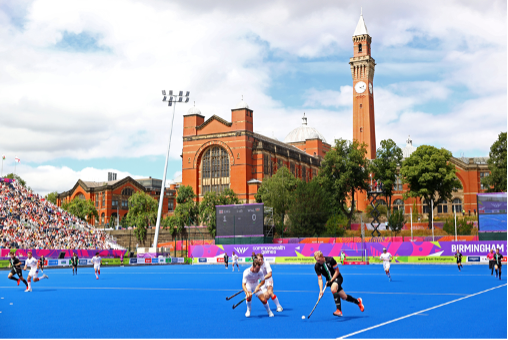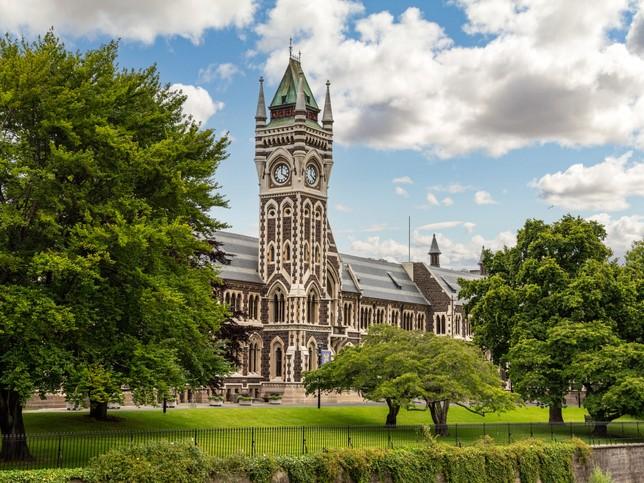
Transforming a university campus into an athletes’ village

You may also like
During the UK’s hottest summer on record and as the world was emerging from a global pandemic, we were gearing up to be an official partner of the Birmingham 2022 Commonwealth Games (B2022). Our participation included hosting the largest athletes’ village in the games’ history and providing facilities for hockey and squash matches. In hindsight, it was the most amazing journey for our staff, students, city and partners, both in the run-up to the games and in their operation. But it was not an easy feat to pull off. We achieved it through meticulous planning, adaptability, teamwork and strong partnerships across the institution and externally.
Responding to last-minute changes
We had half the time to prepare that previous host cities had enjoyed – and much of our work had to be done during lockdowns. In addition, our planning was affected by major external challenges including the invasion of Ukraine, political uncertainty in the UK, fluctuating athlete numbers caused the pandemic and a series of train strikes. Initially, we were signed up to host 1,500 members of the games workforce, but after the construction of Perry Barr Village was delayed, we ended up housing 3,200 athletes from across the world.
Creating the ‘biggest hotel in Europe’
Just a week after the last student left our on-campus accommodation for the summer, we managed to create one of the biggest hotels in Europe. The fast turnaround stretched us, and it was all hands on deck – at one stage, two of our directors donned rubber gloves to help clean bathrooms to prepare for our first international guests.
A hotel is a very different proposition from student accommodation. For example, we needed to equip all rooms with bath sheets and linen, which we don’t normally stock. The switch to a games village presented major challenges. We had to:
- build and equip three dining halls and four kitchens in just four weeks
- place new food and beverage outlets in pedestrianised areas, inaccessible to vehicles
- install temporary water, waste and power provision as well as refrigerated storage
- provide about 8,000 university staff with accreditation passes that allowed them to work on campus during games time
- recruit 500 staff for four daily shift patterns, 75 per cent from the local area
- accommodate and arrange staff transport, and provide uniforms of all sizes
- work with so many specialist teams that we needed a four-page glossary to keep track of all the acronyms!
In the 18-month lead-up to the games, the university’s accommodation, catering, cleaning and waste, security, parking and sport teams met monthly to iron out these issues. With so many people involved, we had to be meticulous about communicating anything that might affect normal university activity, and we conducted tours for students, staff and visitors to show them the huge scale of the transformation. As the first athletes arrived, we accelerated to daily meetings at 6.30am. By the time the games began, on a boiling hot day in July, the sense of excitement was at a fever pitch.
Serving 10,000 meals a day
To fuel the 3,000 athletes and 1,000 support staff in the athletes’ village, 500 catering staff served 10,000 meals and 15,000 drinks for 18 hours every day for 14 consecutive days. For context, summer conferences at the university usually cater for a maximum of 600 delegates.
We worked with the food consultancy group Russell Partnership to create a well-balanced menu that would suit every palate and also showcase food and drink from the West Midlands.
Our chefs aimed very high – sometimes, too high: during an early food-tasting session, the games committee baulked at carrots roasted with turmeric and requested simpler fare. But we got the balance right on the day, and the authentic African Caribbean and Asian menus, and British dishes made with local ingredients, were enthusiastically received.
As the games got under way, you could feel the whole university community glowing with pride at being part of such a huge international event. Seeing the Royal Family at our beautiful hockey pitches on television, with the university’s domed Aston Webb building on the horizon, was wonderful.
The entire experience fine-tuned our event-planning expertise. Only through meticulous planning, stringent oversight and unprecedented levels of teamwork – vital when working with such a large number of organisations – were we able to succeed.
Malene Stanley is director of venues and events, campus services at the University of Birmingham.
The University of Birmingham has been shortlisted for International Collaboration of the Year at the Times Higher Education Awards 2023 #THEAwards. See the full list of shortlisted candidates. Winners will be announced at a ceremony on 7 December in Liverpool.
Academics and university leaders from across the UK and Ireland will come together on 6-7 December at THE Campus Live UK&IE to discuss institutional strategies, teaching and learning, the student experience and more. Join us for this two-day event in Liverpool.
If you would like advice and insight from academics and university staff delivered direct to your inbox each week, sign up for the Campus newsletter.


